Research
Mak-RIF engages Private Sector, NGOs, and CSO representatives in Uganda Review of the Mak-RIF Research Agenda
Published
2 years agoon
By
Mak Editor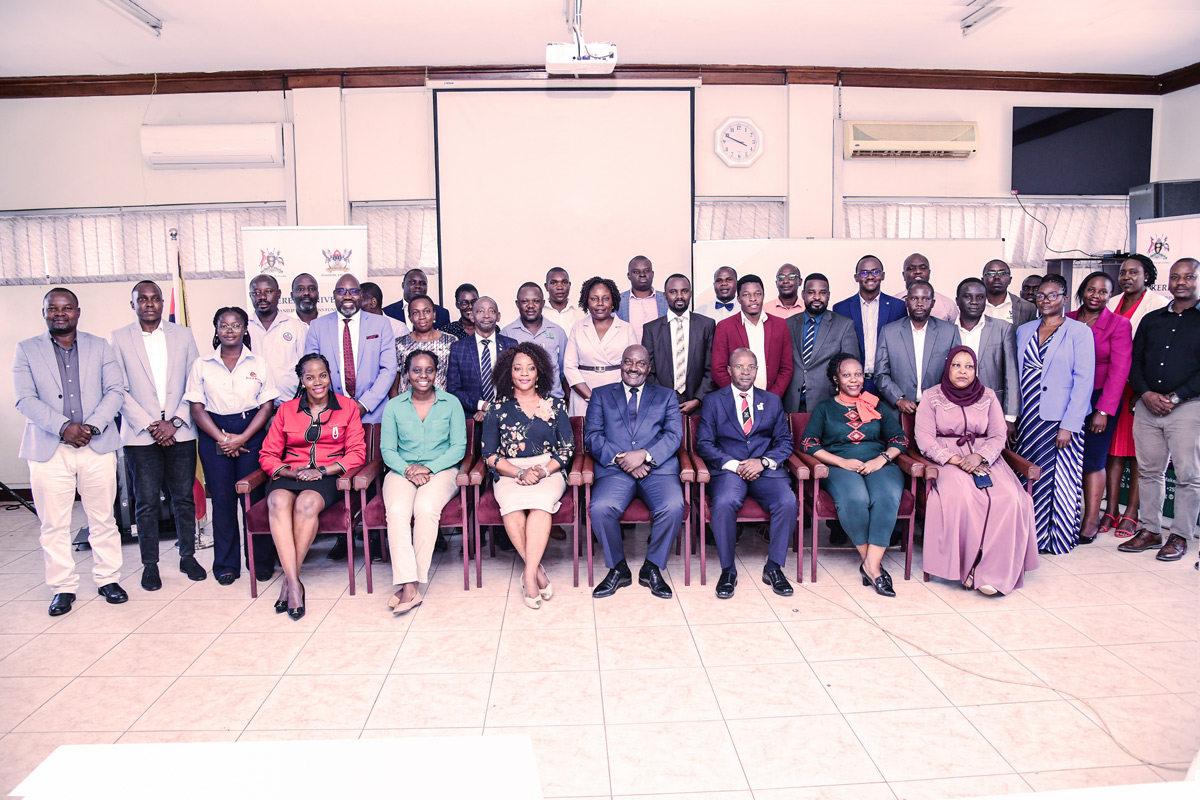
On November 9th, 2023, the Mak-RIF Grants Management Committee (GMC) and Secretariat convened representatives from the Private Sector, Non-Governmental Organizations, and Civil Society Organizations in the Makerere University College of Computing and Information Sciences Conference Room. This was yet an opportunity for Mak-RIF to share her achievements to date while reflecting on the guiding Research Agenda. It was also an opportunity for participants to garner feedback from the engagement participants to inform the review of the Mak-RIF Research Agenda.
It is usually important to know who is in the room not only for purposes of knowing who is with you and or accountability but also to enhance networking and collaborations that might emanate from the networking opportunities therein. In this regard, this engagement started with self-introductions. Participants included representatives from Joint Medical Stores, Uganda Tourism Association, Legacy Road Safety Initiative, Environmental Rights NGO, Uganda Christian University, Pathfinder International, USAID Uganda Family Planning Activity, Uganda Law Society, Save for Health Uganda, Aloesha Organic, Private Sector Foundation Uganda, Radio Simba, Busitema University, International Rescue Committee, Green Herbs Uganda Limited, Uganda Catholic Medical Bureau, Uganda Moslem Catholic Bureau, Uganda Manufacturers Association, Zimba Women, Fundi Bots, Water for People, M’Omulimisa, Teenage Mothers and Child Protection Organization, RECO Industries, Uganda Connect among others.
Prof. Fred Masagazi Masaazi, Chairperson of Mak-RIF GMC welcomed all participants noting that for the last five years, Mak-RIF’s work has been guided by the Research Agenda currently under review. “We are looking forward to receiving views from all of you representatives of stakeholders in the country and beyond to further inform the review of the Mak-RIF Research Agenda,” Prof. Masagazi said. He recognized the continuous support from all stakeholders since 2019 during the inception stages towards building the Mak-RIF story. “Several of you or your colleagues in the institutions and organizations in which you serve are part of research teams and have continued to support our researchers in several ways. Some of you have joined in our research and innovation outputs dissemination sessions, thank you all” he added. He highlighted some questions to guide the review of the Mak-RIF Research Agenda including the following;
- Has the Mak-RIF met community expectations yet? If not, what else can be done?
- Is there a need to develop a new Research Agenda or even review the existing one?
- Do the prevailing socio-economic conditions require a new Research Agenda?
- What should be included in the new Research Agenda?
- Would all our ideas contribute to Uganda’s National Development Plan, Sustainable Development Goals, Sector Priorities etc.?
- Do our ideas rhyme with the National Development Plan? Can we work together to translate Makerere University into research-led university?
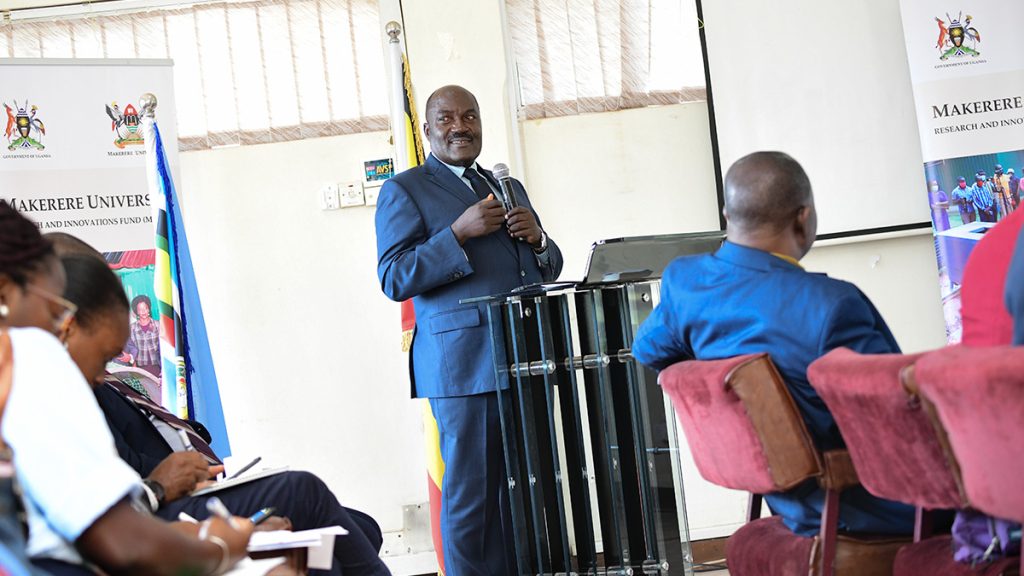
“Our interest is in knowing from you our meeting participants which other areas we can conduct research in. What else can we do together? We still need additional funds to support research, where else can the university source for funding? Can we work together to source more funds because we cannot rely on Government funding alone?” Prof. Masagazi said. He further guided the engagement participants saying that Mak-RIF shall implement all ideas provided they speak and are in line with the National Development Plan, Sustainable Development Goals, Sector Priorities as well as the Makerere University Strategic Agenda of becoming a research-led institution. He concluded his welcome note by calling upon all participants to secure time and interact with the Mak-RIF website for additional information about the ongoing research and innovation work.
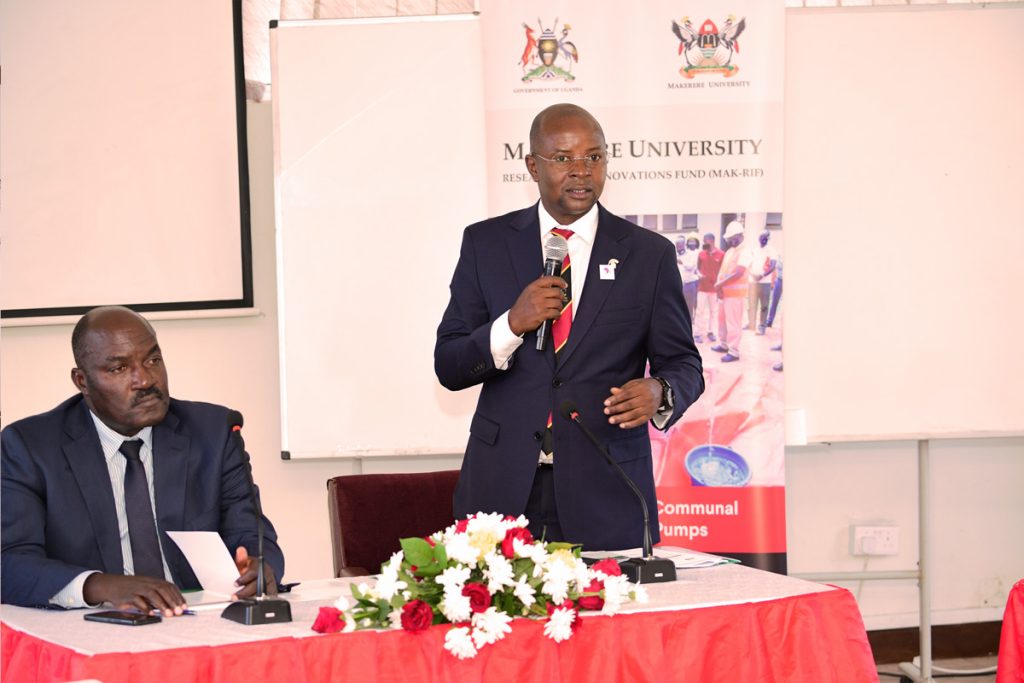
Prof. Edward Bbaale, Director of the Directorate of Research and Graduate Training representing Prof. Barnabas Nawangwe, Vice Chancellor Makerere University officially opened this engagement and later chaired the discussion session to further generate additional input to the operational Mak-RIF Research Agenda. He thanked all participants for honoring the invitation noting that without such engagements the university cannot easily achieve its strategic objectives and goals. He reechoed the fact that Mak-RIF is currently supporting 1,061 multidisciplinary research and innovation projects (including 117 PhD awards and 41 multiyear projects our most recent awardees). These projects receive funding, technical and non-technical support necessary to conduct development research and generate innovative solutions directed towards addressing diverse challenges in the communities in which we live and serve.
Prof. Bbaale also appreciated all researchers and innovators not only from Makerere University but also from other institutions which were represented in the day’s engagement and embraced all the previously shared funding opportunities, prepared and submitted applications to benefit from the Government Fund, saying that it is the way to go. “Thank you for remaining open to partnering with researchers from Makerere University to apply for funding and later implement the projects. It is through the Mak-RIF initiative that Makerere University is enabling several university faculty, students, administration, and collaborating institutions including the Government, Private Sector, Non-Governmental Organizations, and Community Service Organizations to contribute to the local generation of translatable research and scalable innovations that address key gaps required to drive Uganda’s development agenda” he added. Prof. Bbaale also emphasized the need to join efforts to scale research and innovation outputs within Makerere University but also in Uganda noting that scaling research and innovation outputs to the market is a task for all of us.
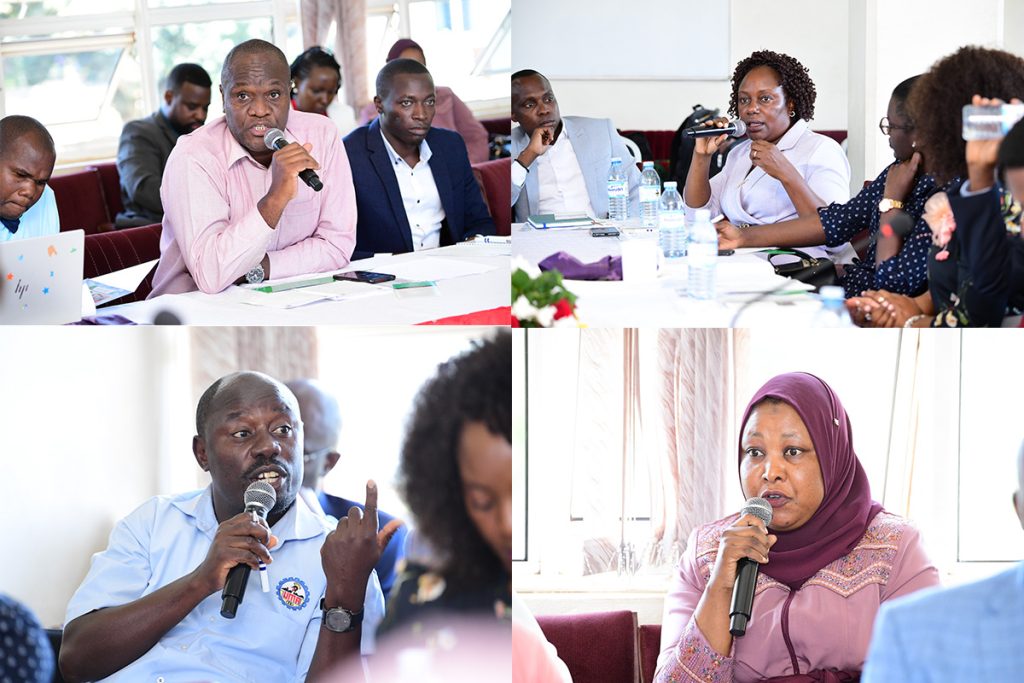
After Prof. Bbaale delivered the Vice Chancellor’s remarks, Dr. Roy William Mayega, the Coordinator of Mak-RIF shared a highlight of how far the Mak-RIF Research Agenda had guided operations since 2019. He noted that the Mak-RIF Research Agenda currently comprised of 14 Themes including the following;
- Transforming the agricultural sector
- Sustainable health
- Re-imaging Education
- Water, sanitation and environmental sustainability
- Harnessing the social sector to drive development
- Harnessing tourism, wildlife and heritage to drive development
- Sustainable Planning, finance and monitoring
- Leveraging public service and local administration for efficient service delivery
- Defense and security: Achieving sustainable peace and stability
- Strengthening law, governance, human rights and international cooperation
- Harnessing Information and Communication Technology to drive development
- Manufacturing, science and technology as tools to accelerate development
- Catalyzing business and enterprise
- Energy and Minerals as drivers of rapid economic development.
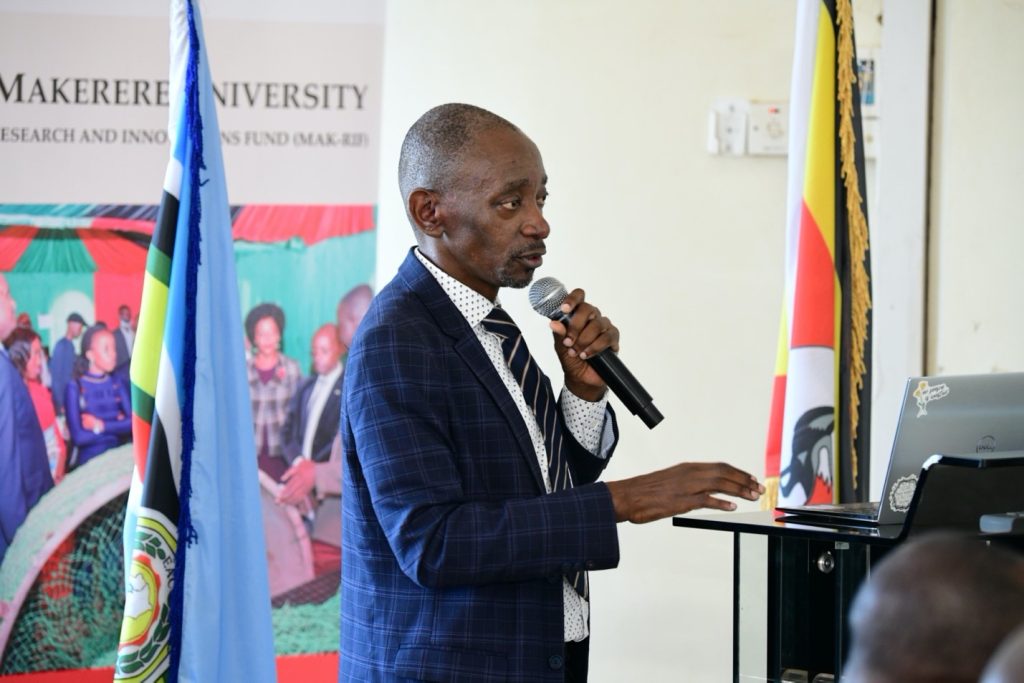
Dr. Mayega also shared examples of research and innovation outputs emanating from the fund. These include the following;
- An interrogation of Tax Education Gaps in the Informal Sector and how they can be leveraged in broadening the Tax Base,
- Another project is exploring to leverage music as therapy for emotional distress of cancer patients,
- Solar Powered Autoclaves for use in Rural Health Centers, The Pedal-Operated Seed Cleaner,
- An electronic partograph for improved monitoring of labor, to reduce maternal mortality,
- Integration of on – and off-grid decentralized renewable energy systems: Enabling Uganda’s largest distributor UMEME to pilot the integration of off-grid decentralized renewable energy systems with grid systems to extend electricity access to unserved communities,
- The Organ and Tissue Biobanking project at the Makerere University College of Health Sciences,
- A project on Transforming Presumptive Age Estimation in Uganda: Methods, Certainty and The Law,
- The Touchless Hand Washing device currently being used in different hospitals and community markets,
- Value addition to Sorghum and Potatoes supporting farmers in South Western Uganda to earn a living and avoid wastage of produce among other projects shared on the Mak-RIF Website https://rif.mak.ac.ug/
During the discussion session, several participants applauded the current Research Agenda noting that it was well thought out and should continue to guide Mak-RIF Operations. The engagement participants also shared some ideas to further inform the review of the running Research Agenda. These included the following;
- Radio stations being the most popular means of communication, we need to carry out audience analysis on television, radio, and even social media, identify and allocate resources to generate the right content, and further leverage technology innovations in both broadcast and print media.
- Youth unemployment and emerging issues as a result of this including skills development/training, tracking and taking into consideration the changing needs of the business world so as to re align Uganda’s training approaches,
- Herbal medicines and the indigenous innovators, how can we support processes to establish the efficacy of these products?
- Can we become more intentional about supporting researchers and innovators through the processes of Intellectual Property acquisition? It is important that Memorandums of Understanding are drafted, reviewed, and signed with relevant Registration Services Bureaus.
- It was also suggested that there is a need to continue supporting efforts to transform research outputs into economically viable and scalable innovations and to inform policy review and cause impact.
- Collaborations and partnerships with the private sector to further scale research and innovation outputs. At this engagement, Uganda Catholic Medical Bureau, Uganda Moslem Medical Bureau, Uganda Manufacturers Association, Water for People, and Uganda Law Society (specifically supporting Intellectual Property Rights acquisition processes and Revenue and Tax sensitization) among other organizations openly expressed interest in partnering with Mak-RIF to review and move forth some of the innovations within specific and related working areas.
- There is a need to support product development and packaging efforts to fit the national, regional, and international markets.
- We need to remain intentional in marketing the work we are doing within and outside Uganda.
- In an effort to achieve sustainable health, financing health insurance for example is a key issue. How can the National Insurance Scheme be further informed and supported through the work we are all doing? How can we contribute to the Global Health Security-related efforts in Uganda?
- For the case of agriculture, how can farmers adopt more organic agriculture so that we can even fight some of the non-communicable diseases with organic agricultural products? Could we also explore more involvement of the rural communities in the research and innovations we are working on? This would enable us to further harness indigenous knowledge. Establishing linkages with the informal sector is paramount.
- Could we also re-look at the various existing themes and integrate some of them that speak to each other? In so doing we are dealing with the replication of efforts and knowledge among others.
- Can we allocate some resources to further enhance our visibility (showcase what good we are doing) to key stakeholders including the Government of the Republic of Uganda in an effort to solicit for additional funding?
- There is a need to identify the Research Agenda niche thematic areas within which we can capitalize on to further publicize the fund and attract additional funding. We can harness the low-hanging fruits and benefit from pushing the agenda forth by leveraging these.
- In Uganda, road safety is crucial given the increasing number of traffic injuries, rescue of crash victims and crash data management are important aspects we should also plan to include in the Research Agenda. The research question could be; How can we have safe roads and attain safe travels for all if not majority of the road users?
- There is also a need to relook at and up research on Artificial intelligence in addition to early warning systems for natural disasters, early diagnosis of non-communicable diseases, strengthening community health systems, big data for industry, occupational health and safety, issues of regulation, and community accountability among others.
- Specifically, under theme 12, innovations developed, tested, iterated, and revised accordingly should reach the targeted end users. How do we commercialize the research and innovation outputs developed to date?
- What else can we do together to reduce or even avert teenage pregnancy? How can we further support teenage mothers?
- What can we do to improve the management of poison victims in Uganda? Can we do away with poisoning and its related effects in the country?
- For tourism, how can we avoid over reliance on international tourism? Can we expound our products range? Strengthen our human resource, explore virtual tours etc.
- It would be helpful to have a theme on cross-cutting issues for example indicating that fund beneficiaries are primarily Makerere University staff although others can join the project teams, how the 14 themes feed into the overarching country development themes etc.
- We need to have a theme speaking to research on safe water given the dire need now for us to ensure access to safe water for all.
- ETC.
Prof. Bbaale thanked the engagement participants for their active participation during the discussion session noting that all the input gathered was going to be further synthesized and made ready to inform Mak-RIF Research Agenda. He reechoed the fact that all input to the Mak-RIF Research Agenda needed to speak to and be in line with the National Development Plan, Sustainable Development Goals, Sector Priorities as well as the Makerere University Strategic Agenda of becoming a research-led institution. He wished all participants the very best saying that Makerere University is focused on building for the future for God and our country.
Prof. Bbaale thanked the engagement participants for their active participation during the discussion session noting that all the input gathered was going to be further synthesized and made ready to inform Mak-RIF Research Agenda. He reechoed the fact that all input to the Mak-RIF Research Agenda needed to speak to and be in line with the National Development Plan, Sustainable Development Goals, Sector Priorities as well as the Makerere University Strategic Agenda of becoming a research-led institution. He wished all participants the very best saying that Makerere University is focused on building for the future for God and our country.
Media mentions
- Uganda Broadcasting Corporation News Bulletin on November 9th, 2023 https://youtu.be/Sbc78ojHu30?si=6fnqIrK_Bi7vGcjo
- Bukedde Television on November 10th, 2023
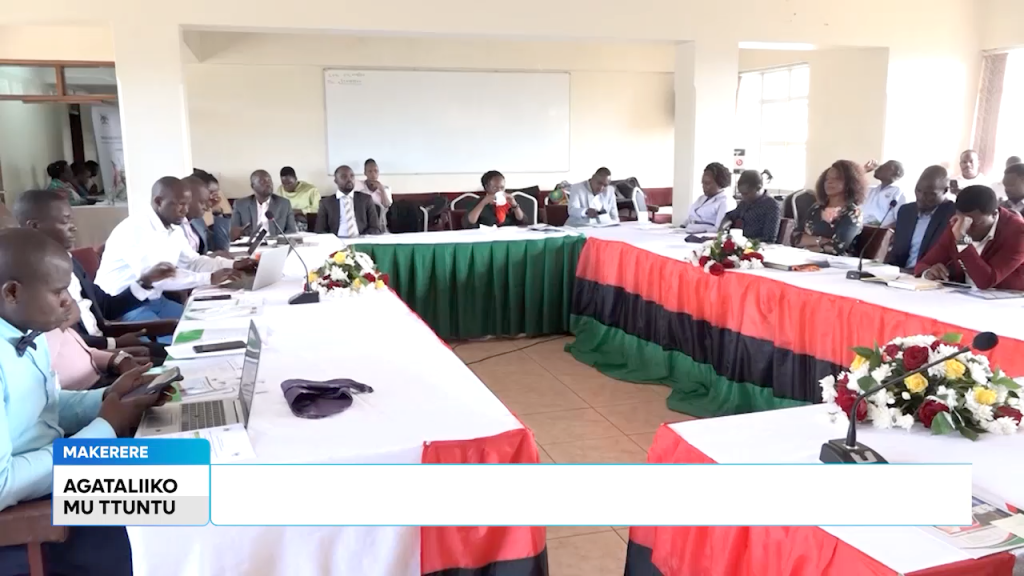
By: Harriet Adong, Mak-RIF Communications Officer
Contributors
Mrs. Phoebe Lutaaya Kamaya, Mak-RIF Deputy Coordinator
Ms. Evelyne Nyachwo, Mak-RIF Research Support Officer

You may like
-
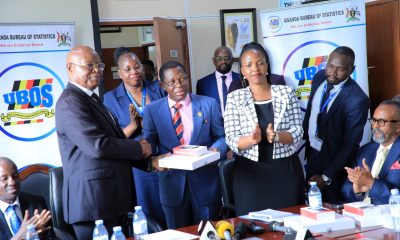

Makerere University Receives 700 Tablets from UBOS to Boost Statistical Activities
-
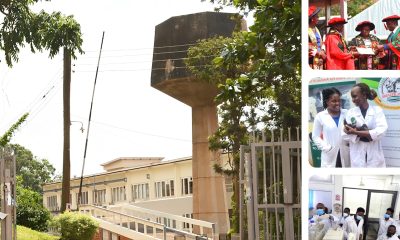

CoVAB Annual Report 2024
-
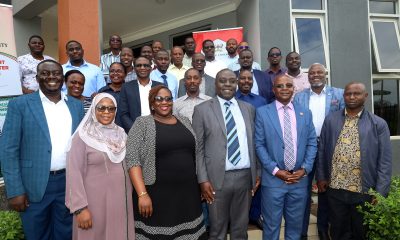

Uganda Deepens Economic Governance with Training on Regulatory Cost-Benefit Analysis
-


CoCIS CIPSD Online Short Courses Jul-Nov 2025
-
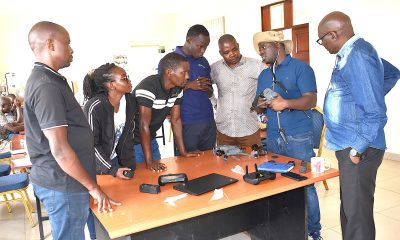

NbS4Tea Project Team Makes Great Progress, Deploys Drones for Data Collection
-
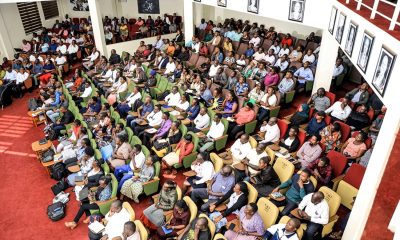

Call for Abstracts: 2nd East African Symposium and Expo on Trauma, Injuries, and Emergency Care – 2025
Agriculture & Environment
NbS4Tea Project Team Makes Great Progress, Deploys Drones for Data Collection
Published
1 week agoon
June 24, 2025
****Funded by the Danish Fellowship Centre under Denmark’s Ministry of Foreign Affairs, NbS4Tea is a five-year initiative aimed at enhancing climate resilience and tea productivity in Uganda.
Launch of drones for data collection
The Nature-based Solutions for Tea (NbS4Tea) project has registered a significant milestone with the successful deployment of drones to improve environmental and agricultural data collection.
On 19th June 2025, the project team officially launched the drones at the Rwebitaba Tea Research Centre in Kyenjojo District, the project’s main research hub. The launch event included hands-on training sessions by Mr. Timothy Mutungi, a certified Remote Sensing Drone Pilot. Mr. Mutungi provided detailed instruction on drone operation, safety procedures, and data acquisition techniques specifically tailored to the project’s goals. The training was attended the core NbS4Tea researchers as well as students supported by the project.

By utilizing drone technology, the team will be able to capture high-resolution imagery and gather critical environmental data across vast tea-growing areas. This will enable more precise assessments of biodiversity, soil health, water use, and overall ecosystem services. The valuable insights generated will guide the development of sustainable, nature-based agricultural practices with the potential for widespread adoption throughout the tea industry.
About the NbS4Tea Project
NbS4Tea is a five-year initiative aimed at enhancing climate resilience and tea productivity in Uganda. Funded by the Danish Fellowship Centre under Denmark’s Ministry of Foreign Affairs and led by Dr Emmanuel Arthur from Aarhus University, the project is being implemented through a consortium of Ugandan and Danish institutions namely: Makerere University, the National Agricultural Research Organization (NARO), Uganda, Uganda Tea Association, Aarhus University, Denmark, and Kick-start International.

The primary objective of the project is to sustainably close the tea yield gap in Uganda by developing research-driven, nature-based solutions that enhance the climate resilience of tea production systems. This involves identifying climate-resilient tea varieties, integrating tea prunings and banana by-products, utilizing nitrogen-fixing agroforestry trees, and improving irrigation management. The approach emphasizes socio-economic feasibility, capacity building in research, and a market-oriented, multi-stakeholder collaboration to ensure both environmental and economic sustainability.
At Makerere University, the project is coordinated by Dr Alex Nimusiima from the Department of Geography, Geo-Informatics and Climatic Sciences at CAES. Other Project members are; Dr Grace Nakabonge from the Department of Forestry, Biodiversity and Tourism; Dr Prossy Nakawuka from the Department of Agricultural and Bio-systems Engineering; Dr Twaha Ali Basamba from the Department of Agricultural Production; and Dr Alice Turinawe from the Department of Agribusiness and Natural Resource Economics.

Specific objectives
- Identify and quantify climate change impacts on tea yield and quality based on historical and newly obtained data and novel data mining methods.
- Screen, select and recommend tea varieties adapted to abiotic (drought and heat) and biotic stresses (diseases and pests).
- Develop new knowledge on the potential of local waste biomass (tea prunings, banana pseudostems and peels) as soil amendments- mulch, compost, biochar, to recycle nutrients, improve soil fertility, increase carbon sequestration and alleviate drought.
- Reveal NbS through agroforestry combined with organic mulch, irrigation and resilient tea varieties that increase biodiversity and tea yield.
- Innovate new methods to enhance tea production under climate change through rainwater harvest and climate-smart irrigation infrastructure.
- Empower vulnerable groups (women, youth, and people with disabilities) in tea production and processing to ensure multi-actor involvement and socio-economic benefit outreach of the proposed NbS in tea cultivation and production.
- Identify export market strategies for NbS tea products, aligned with consumer preferences.

Progress thus far
Launched in January 2024, the project, organized in five work packages, has registered significant progress. Each of the work packages listed below supports one PhD student and one Masters’ student. The PhD students are: i) Mr. Adiga Hassan from the Department of Geography, Geo-Informatics and Climatic Sciences at CAES conducting research under work package 1; ii) Ms. Sarah Namayengo from the Department of Forestry, Biodiversity and Tourism conducting research under work package 2; Ms. Vivian Namutebi from the Department of Soil Science and Land Use Management undertaking research on work package 3; Mr. Keneth Chelimo from the Department of Agricultural and Biosystems Engineering conducting his research under work package 4; and Ms. Moreen Asasira from the Department of Agribusiness and Natural Resource Economics focusing on work package 5. The Masters students are: i) Ms. Evelyn Katasi from the Department of Environmental Management at CAES (work package 1), Mr. Vereriano Turyahebwa from Department of Forestry, Biodiversity and Tourism (work package 2); Mr. Ben Okurut from the Department of Soil Science and Land Use Management (work package 3); Mr. Augustine Okot from the Department of Agricultural and Biosystems Engineering (work package 4); and Mr. Augustine Kigozi from the Department of Agribusiness and Natural Resource Economics (work package 5)

Work packages and achievements registered
Work Package 1: Climate change impacts on tea yield and quality – Headed by Dr. Alex Nimusiima
This work package centres on the analysis of historical and projected climate conditions in the study area. It examines how current climate patterns influence tea production, as well as the potential effects of future climate change on tea yield and quality.
Progress
i) A household survey assessing the socio-economic status of tea farmers and the effects of climate variability on their livelihoods has been completed.
ii) The collected data has been cleaned, and the Masters student supported under this work package is currently writing her thesis based on the survey findings.
iii) A historical climate analysis of the study area has been conducted by the PhD student, who is now preparing a manuscript.

Work Package 2: Screening & selecting tea genotypes for resilience to abiotic and biotic stresses – Headed by Assoc. Prof. Grace Nakabonge
This work package focuses on evaluating existing tea genotypes for their resistance to pests and diseases, using chlorophyll fluorescence imaging as a diagnostic tool.
Progress
i) A screen house has been constructed to serve as the experimental site.
ii) Germplasm from two tea varieties is currently being cultivated in the screen house in preparation for the upcoming experiments.
iii) A drone has been acquired to assist in data collection for this work package.

Work Package 3: Evaluation of NbS for climate resilience, higher yield and biodiversity- Headed by Assoc. Prof. Twaha Ali Basamba
This focuses on the characterization of mulch and biochar derived from tea prunings to improve soil health. It also aims to quantify the added value of Nature-based Solutions (NbS) in enhancing tea productivity, promoting climate resilience, and supporting biodiversity.
Progress
- So far, Biochar has been produced from tea prunings and characterized.
- The Masters student supported under this work package is writing his thesis on the results of biochar characterization.

Work Package 4: Innovating smart and scalable irrigation technology for improved tea production- Headed by Dr. Prossie Nakawuka
This work package aims to develop and evaluate smart, scalable irrigation solutions to boost tea production. It focuses on assessing how irrigation impacts tea yield and quality, measuring water use efficiency, and analyzing the economic returns of irrigation practices. Additionally, it explores deficit irrigation and climate-resilient strategies to ensure sustainable tea farming in changing environmental conditions.
Progress
- The irrigation infrastructure is now in place and fully operational at Rwebitaba Tea Research Centre in Kyenjojo District.
- The experimental plots for irrigation experiments are already in place with water pipes.

Work package 5: Socio-economic assessment of tea-agroforestry and selected tea varieties – Headed by Dr. Alice Turinawe
This work package emphasizes co-creation within multi-stakeholder innovation networks to evaluate the economic feasibility and market access of tea agroforestry systems. It also focuses on promoting gender balance and understanding consumer valuation of Nature-based Solutions (NbS) tea from Uganda.
Progress
To date, two co-creation workshops have been successfully conducted and the Masters student under this work package is currently analyzing the workshop results as part of their research.

Expected outputs and outcomes
- Increased tea production, productivity, and biodiversity through the adoption of NbS.
- Increased research and technical capacity of Makerere and R-ZARDI.
- Holistic stakeholder insight on economic feasibility, consumer acceptance and market access strategies, especially for vulnerable groups in the tea value chain.
- Increased job prospects for youth and women in tea production sub-sectors.
- Improved social status and increased incomes of tea farmers, traders, and exporters.
- Improved economic and environmental quality by recycling biomass waste into value-added products dedicated to soil enhancement.
- 4+ high-yielding tea genotypes adapted to drought and heat, diseases and pests.
- 15+ scientific articles, conference presentations.
- Five PhDs and Five MSc degrees.
- Market access assessment and empowerment.

Details on the project: https://news.mak.ac.ug/2024/01/new-caes-project-to-improve-tea-production-in-uganda/
More photos from the event



General
Directorate of Graduate Training Rolls out Research Management Information Sytems (RIMS)
Published
3 weeks agoon
June 12, 2025By
Mak Editor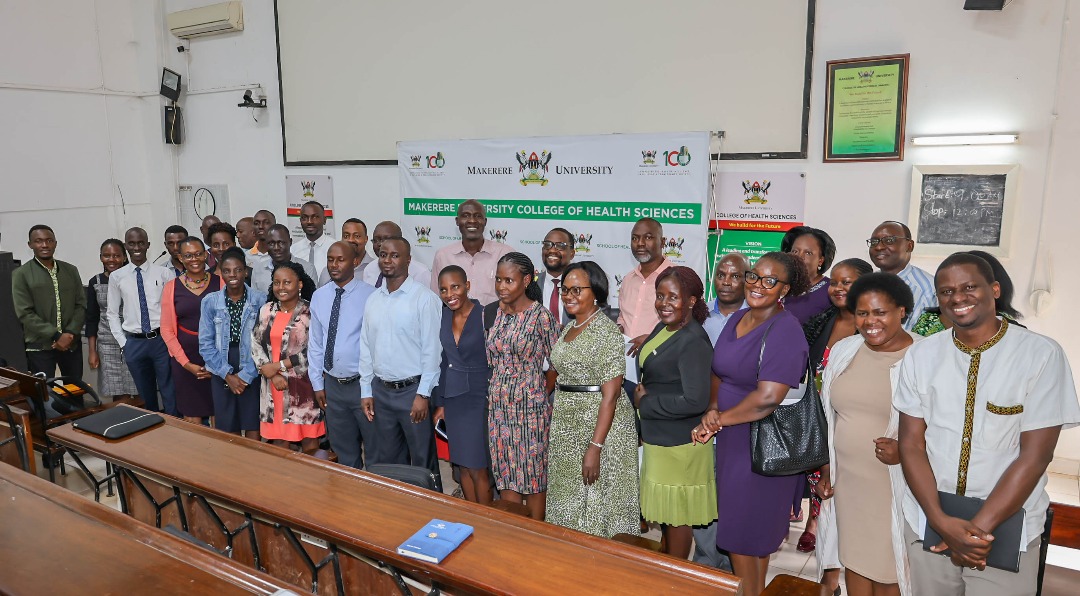
By: Moses Lutaaya
The Directorate of Graduate Training is rolling out the Research Management Information systems (RIMS) to efficiently and effectively monitor the academic progress of all graduate students.
“RIMS will be used to track efficiently every stage of activity of graduate studies from course works, research concept to thesis completion.” The Director of Graduate Training, Prof. Julius Kikooma said.
He added, “The RIMS team is here to share developments on the system that are designed to support the agenda of Makerere university. When graduate students enter a given chapter of their research works, their supervisors will automatically receive mail prompts to swiftly handle, give comments and guide the students on the way forward.”
During the roll out training recently at the College of Health Sciences in Mulago, Prof. Kikooma said, “The Directorate of Graduate Training is working in collaboration with Directorate of Innovation, Research and Partnerships (DIRP) and the Directorate of Information Communication and Technology Support (DICTS) to ensure a smooth training to all the schools and colleges. Digitalising the graduate management process is anticipated to increase the number of graduate admissions and completion in the long run.”
“As the three directorates, we sat and reviewed the university graduate strategy and policies around it. We got reviewed policies and procedures approved by the University Senate last year. We no longer have provisional admission letter requirement for our PhD students. It is now full admission straight away and we follow a cohort system of admission for the PhD by research students.” He added.
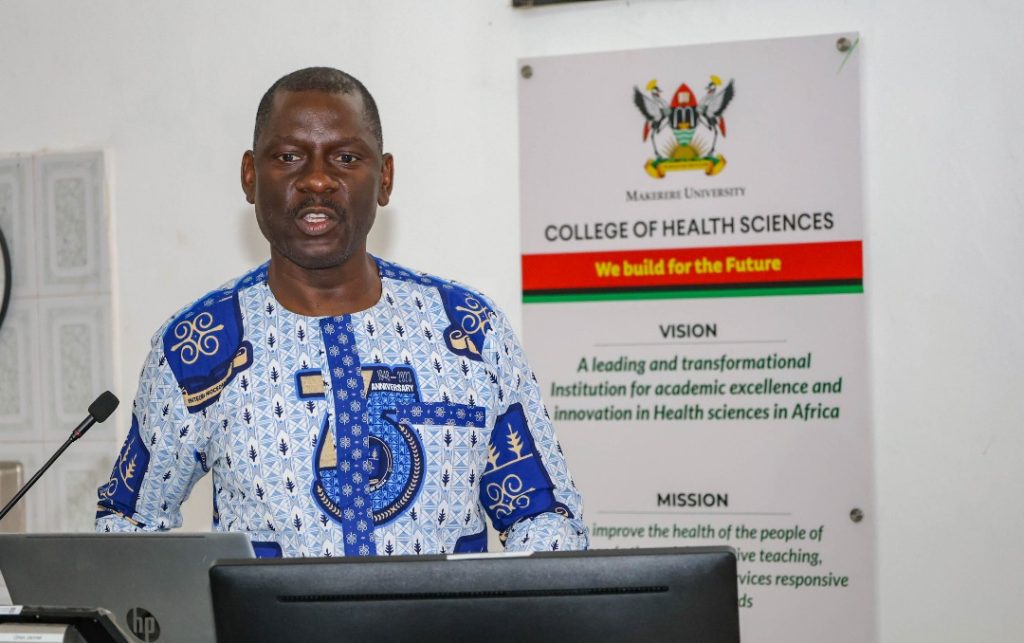
RIMS is a version of how the Directorate of Graduate Training aims to handle the process of systematic tracking of every point of progress in the entire academic journey of graduate students.
The Directorate of Graduate Training has so far conducted the RIMS training at three Colleges namely; College of Health Sciences (CHS), College of Business and Management Sciences (COBAMS) and College of Natural Sciences (CONAS).
The critical stakeholders on the RIMS value chain include Heads of Departments, College Principals and Deputy Principals, Directors, School Deans, Supervisors as well as Graduate coordinators. “All the above are key actors and must be able to use RIMS in the graduate process, capturing all profiles of students and supervisors and should be able to use it appropriately.” He emphasized.
He said that RIMS will bring all stakeholders on the same page and will be able to adequately troubleshoot any hinderance to progress when course works are done, to dissertation and thesis completion. Makerere university target is to increase its graduate students’ enrollment from 19% to at least 30% in the next five years.
Prof. Bruce James Kirenga, Principal College of Health Sciences welcomed RIMS training saying that this kind of E- learning and supervision tracking is the way to handle graduate studies as it seems to reduce the turn around time for student- supervisor responses.
“Every activity in the graduate students learning journey is monitored swiftly. Whatever the students upload on to the system, supervisors get message pop-ups on their mails, review the works immediately and attach comments for the students to appreciate and manage appropriately.” He said.
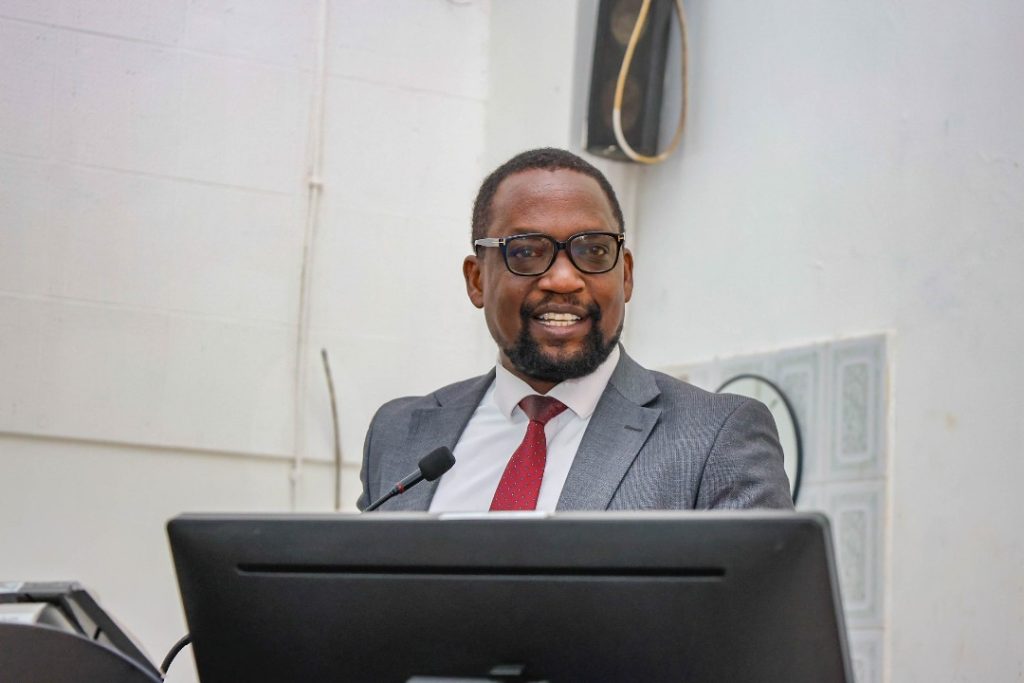
Prof. Kirenga added that the audit trail created under RIMS will provide good progressive academic reports and improve the journey to Doctoral studies.
“Heads of Departments are able to see all students in the department, any pending system approvals, observe completion rates and total progressive over view of each student and that the total overview of department performance will be clearly seen under RIMS.” He added.
Dr. Robert Kalyesubula – the Chair. Dept of Physiology, Makerere University College of Health Sciences said RIMS will improve the efficiency of supervisors while handling the graduate students.
“RIMS views all documents and proposals of students. We will be able to observe which supervisor takes long to respond, the number of days they have taken to respond and how long an issue has pended undone at a certain level.”
Research
Mak and MSU Host Landmark Symposium on Insects for Food, Feed, and Food Security in Africa
Published
3 weeks agoon
June 10, 2025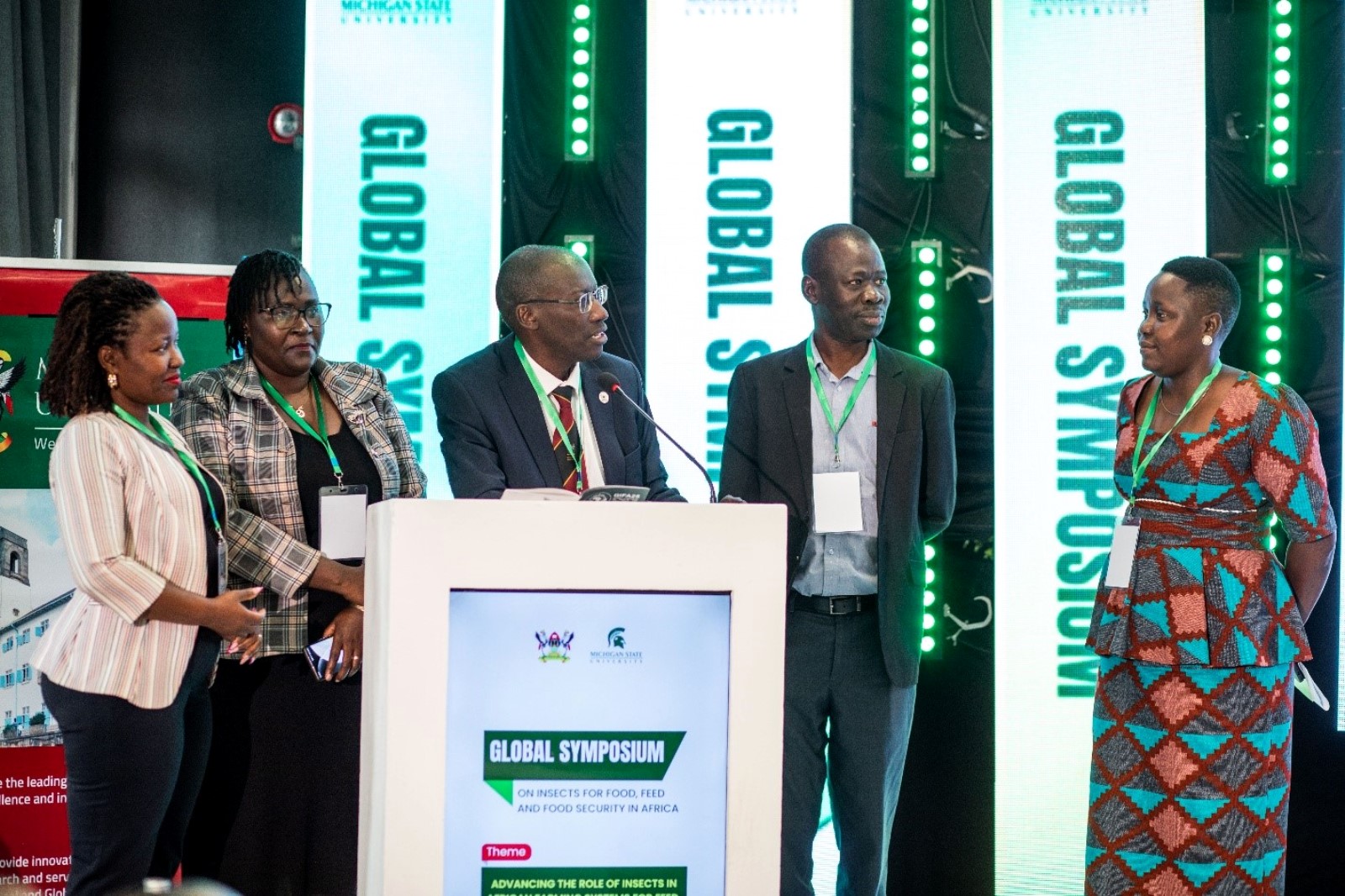
A groundbreaking symposium exploring the role of insects in African farming systems concluded on June 6th, 2025, at Onomo Hotel in Kampala. Convened by Makerere University’s College of Veterinary Medicine, Animal Resources and Biosecurity (CoVAB) in collaboration with Michigan State University (MSU), the event drew participants from over ten countries, including researchers, development experts, regulators, and practitioners.
Under the theme “Advancing the Role of Insects in African Farming Systems for Feed, Food, and Food Security,” the two-day gathering aimed to share knowledge and experiences on integrating insects into food and feed systems to address food security challenges across the continent. The discussions revolved around four key sub-themes namely; Insects as animal feed to promote sustainable livestock production and livelihoods; Insects for human food and food security, including indigenous insect-based diets; Insects for improved soil health and crop production and Commercialization of insect farming, with a focus on regulation and standardization.
The symposium commenced with opening remarks delivered on behalf of Makerere University’s Vice Chancellor, Prof. Barnabas Nawangwe, by his representative, Prof. Frank Norbert Mwiine, Principal of CoVAB. He welcomed participants and commended Dr. Deborah Amulen, Lecturer at CoVAB and chief convener, for organizing a well thought out event. He emphasized that the symposium would not only raise awareness of the role of insects in Uganda’s and Africa’s socio-economic development but also help place insects on the agenda for broader discussions and integration into food security strategies. He said the event served as a platform for knowledge exchange, highlighting the untapped potential of insect farming in transforming food security, sustainable agriculture, and economic growth.
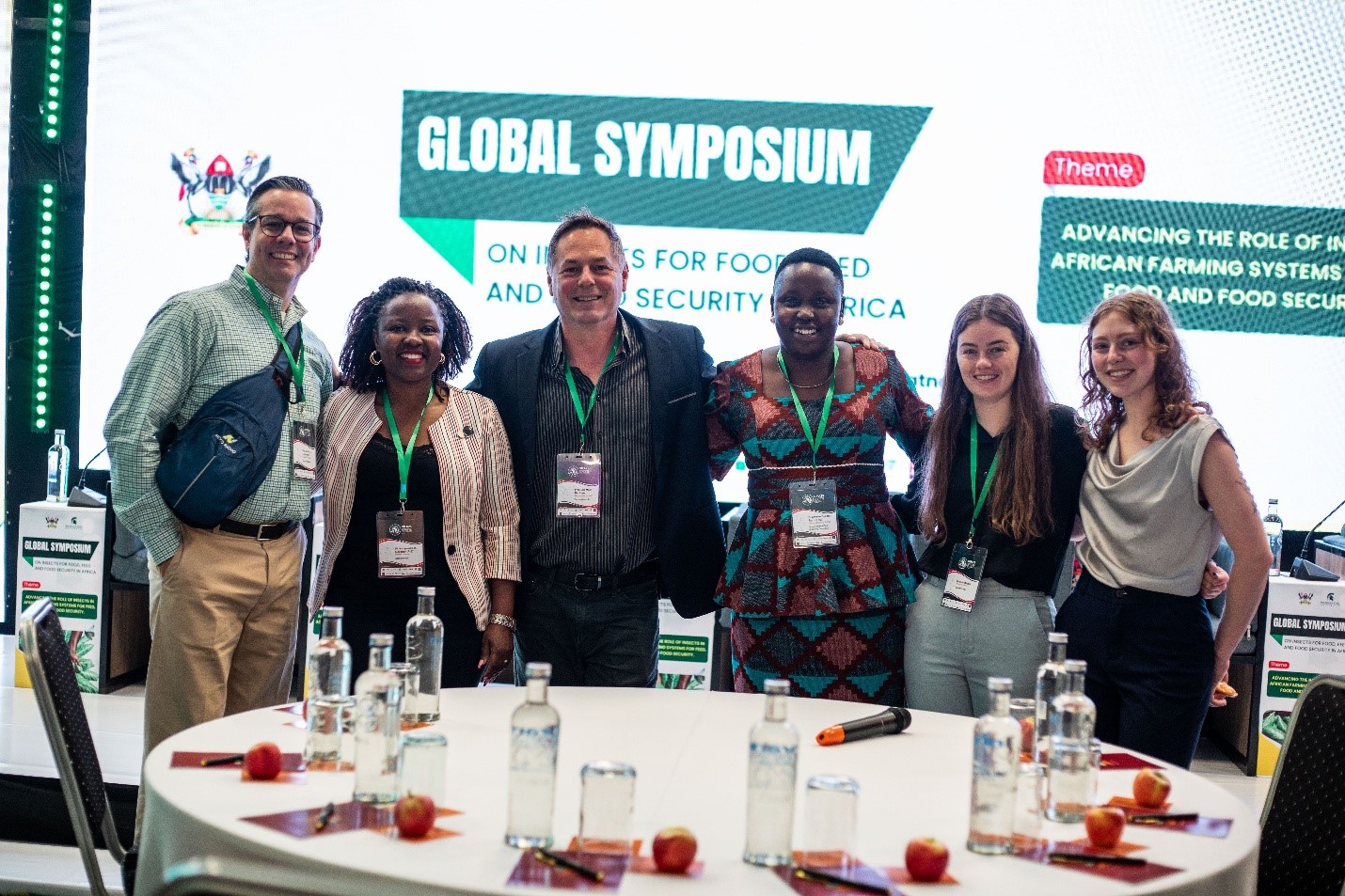
Key facilitators at the symposium were esteemed experts from leading institutions worldwide, who shared their insights on insect-based food systems and sustainable agriculture. Among the distinguished speakers were Prof. Jeffrey K. Tomberlin from Texas A&M University, Prof. Eric M. Benbow from Michigan State University, Prof. Florence Dunkel from Montana State University, Dr. Denise Beesigamukama, a Postdoctoral Fellow, ICIPE Kenya and Dr. Deborah Amulen the host from Makerere University. These are exemplified in their contribution towards academic research and leadership, policy and industry impact and more importantly their expertise in insect science.
During the deliberations, the experts emphasized that insects offer a viable, sustainable, and nutrient-rich solution to Africa’s growing food demands. The event underscored ongoing research and commercialization efforts aimed at mainstreaming insect farming into the agricultural sector. As global interest in alternative protein sources continues to rise, the symposium marked a significant step toward harnessing the potential of insects to enhance food security in Africa.
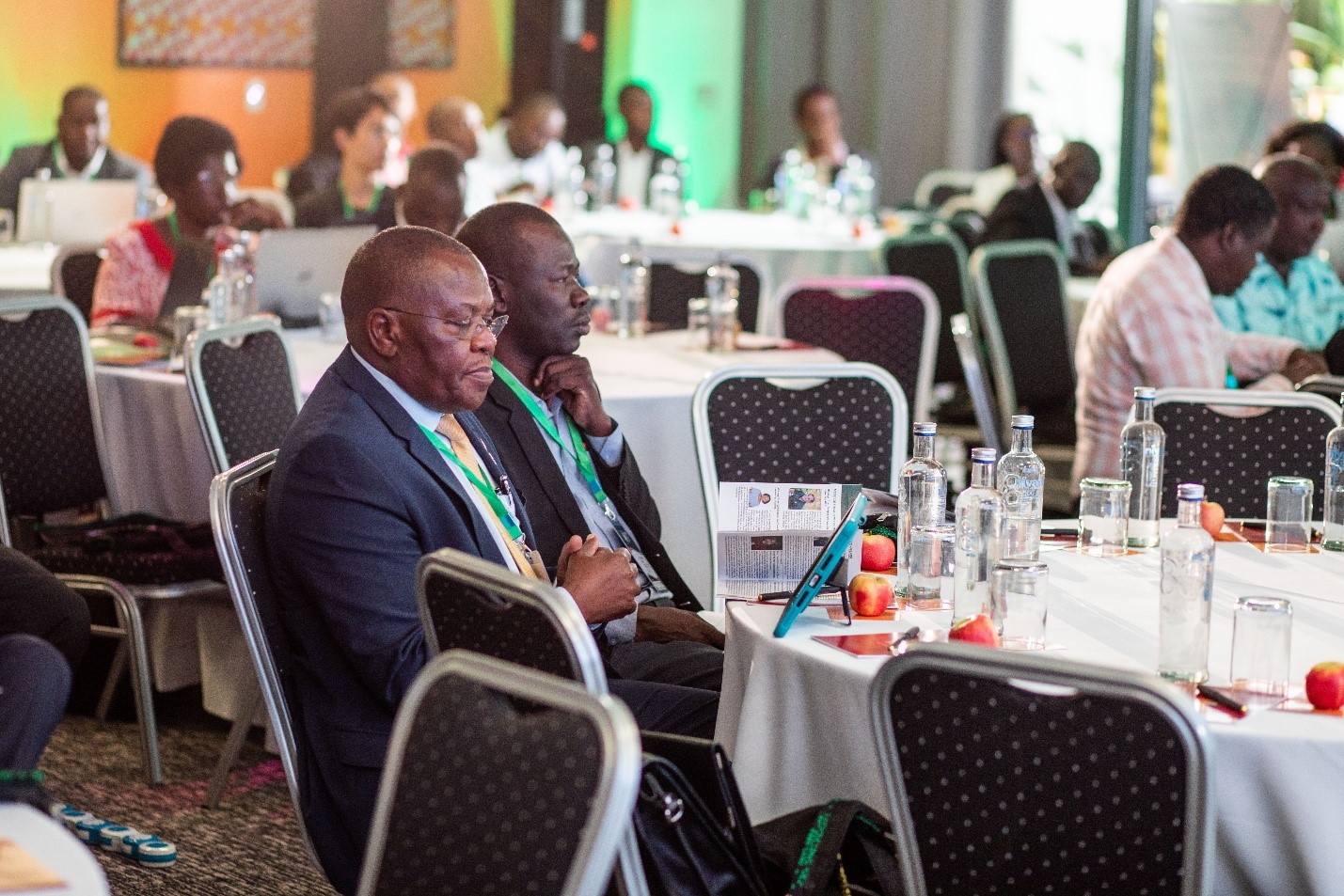
Experts underscored that Africa is home to over 470 recognized edible insect species, providing a rich source of proteins, fats, and essential micronutrients. Insects have historically been a staple in diets across Uganda, Southern Africa, and other regions, serving as a vital food source in times of drought, conflict, and food scarcity. One of the most discussed innovations at the event was the large-scale farming of Black Soldier Fly, which is being utilized to produce not only the larvae but also frass, a high-protein animal feed and organic fertilizer to enhance soil health and boost agricultural yields.
Several scholars presented their research in the area of Insects, where together with the farmers, industry representatives, policy makers and practitioners contributed valuable perspectives on advancing the role of insects in food security, animal feed, and ecological sustainability in Africa. Their discussions underscored the importance of research, policy, and commercialization in expanding insect farming across the continent.
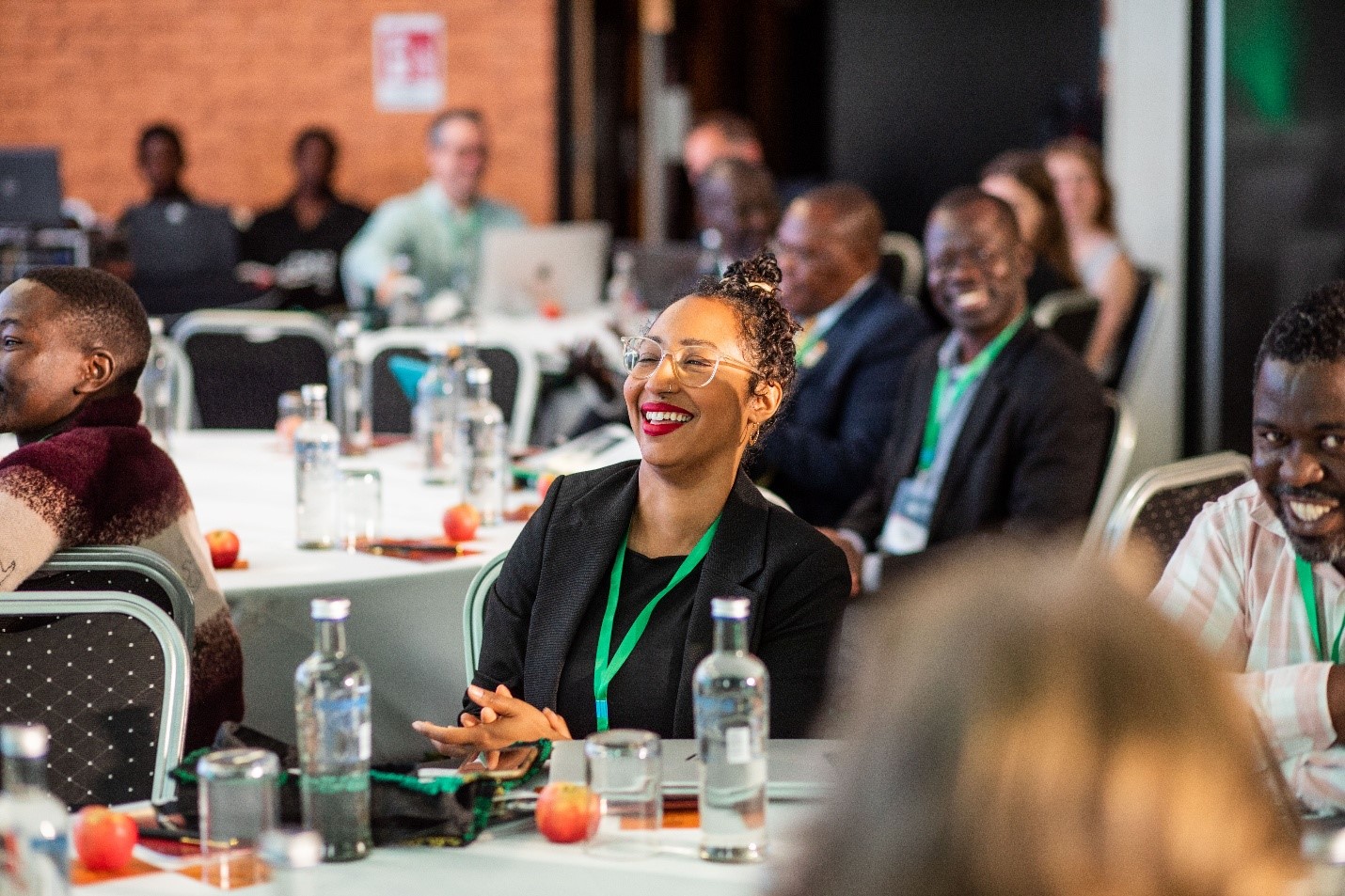
One of the keynote discussions highlighted Uganda’s rich tradition of consuming insects as part of its food culture, reinforcing their significance in nutrition and sustainability. Participants shared insights on local insect consumption practices and their role in livelihoods, drawing from countries like Cameroon, Malawi and many others represented at the event. The forum also featured representatives from key institutions, including the National Council for Science and Technology and The National Agricultural Research Organization (NARO) which contributed perspectives on research, policy development, and commercialization of insects as sustainable food sources, the Ministry for Agriculture, Animal Industry, and Fisheries (MAAIF), emphasizing the Ugandan government’s support for insect farming initiatives.
The Kenya based scientific research institute, the International Centre of Insect Physiology and Ecology (ICIPE) played a key role in the discourse and exhibited several innovations arising from research and their work in insects. Experts explored how insects can revolutionize animal feed production, providing an affordable, high-protein alternative to conventional sources.
With global attention shifting toward alternative and sustainable food sources, experts stressed the need for policy standardization and enhanced investment in insect-based food systems across Africa. During the event, MAAIF announced a $325 million investment through a six-year Smart Agriculture Transformation Project, aimed at expanding sustainable farming practices, reducing environmental impact, and increasing food security through alternative protein sources.
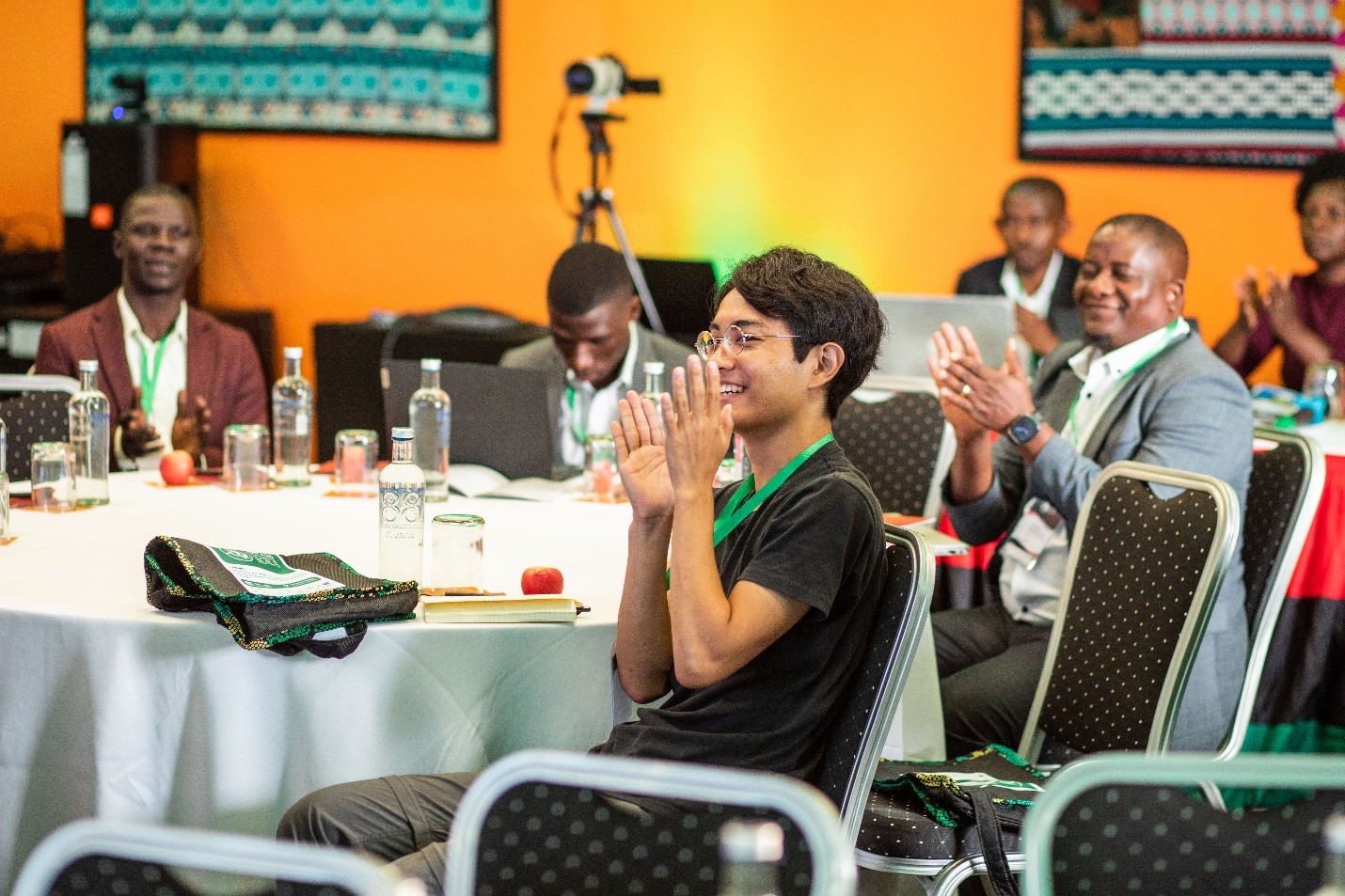
The symposium reaffirmed Africa’s position at the forefront of insect farming research, with discussions centered on scaling production, improving regulation, and leveraging indigenous knowledge for food security solutions. Moving forward, participants emphasized the importance of quality control, standardization, and policy frameworks to ensure safety, scale production, and boost market competitiveness. With Uganda leading discussions on alternative protein sources, the symposium laid the foundation for future innovations in agriculture.
Trending
-

 General6 days ago
General6 days agoMature Age Scheme Exam Results for 2025/2026
-

 General1 week ago
General1 week agoFreshers’ Joining Instructions 2025/2026
-

 General1 week ago
General1 week agoMastercard Foundation Board pays its inaugural visit to Makerere University
-

 General1 week ago
General1 week agoUVCF Makes Case for HEAC Programme
-

 General2 days ago
General2 days agoUndergraduate Admission List Self Sponsorship Scheme 2025/2026